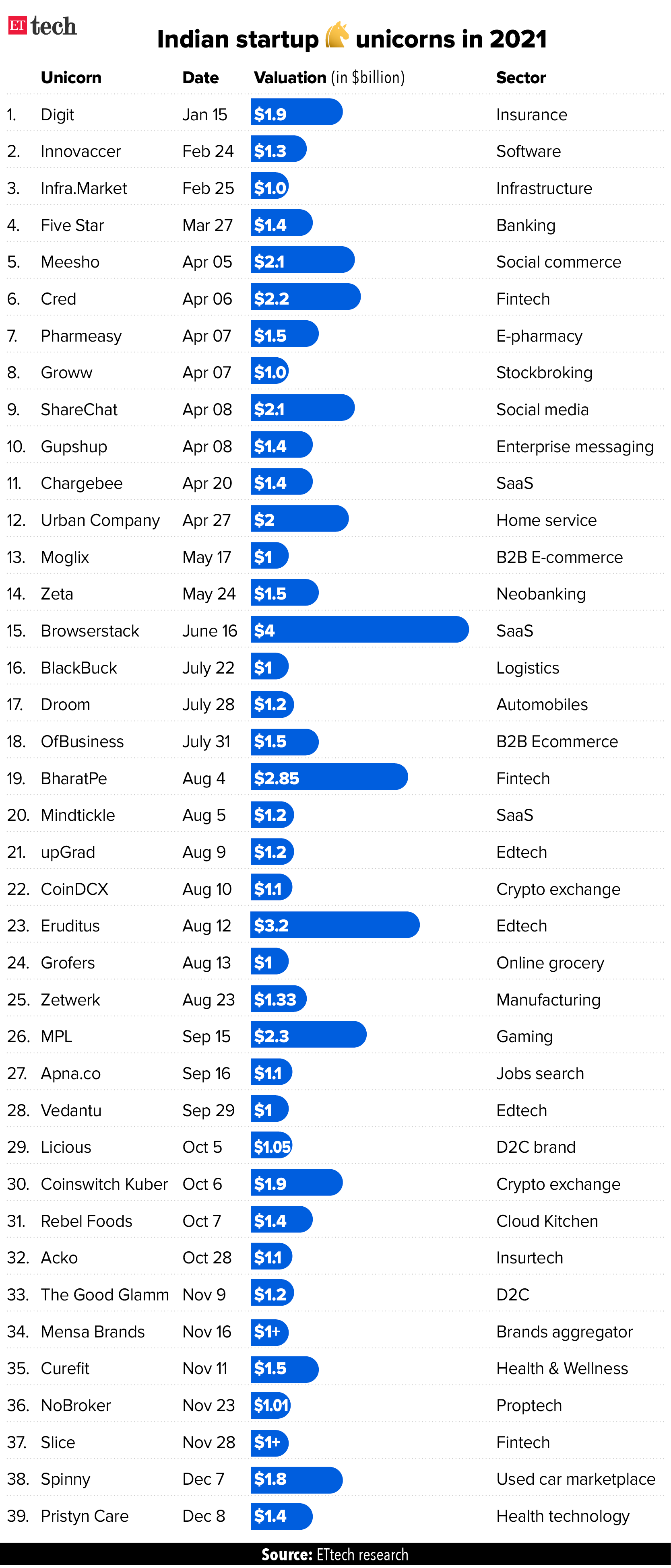Also in this letter:
■ Jack and mean-stalk: Dorsey blocked for Web3 trolling
■ IIFL Fintech Fund to invest Rs 300 crore in fintech startups
■ Elon Musk says he is ‘almost done’ selling Tesla shares
Neobank Open expected to turn unicorn with $100-150 million funding
Open Founders
Open, one of India’s fledgling neobanks, is in advanced talks to close a $100-$150 million funding round that would value it at $1.1-$1.3 billion.
Unicorn soars: If the deal goes through, Open’s valuation will have more than doubled in two months. The company had raised $100 million from Temasek, Google, Visa and others in October at a valuation of $500 million.

Investors: Qatar Investment Authority (QIA), the country’s sovereign wealth fund, is among the investors that have held talks with Open, sources told us. The company also received a term sheet from existing investors such as Tiger Global and Temasek to co-lead the new round, the sources said. A term sheet is a nonbinding agreement detailing the terms and conditions of a potential investment deal.
More in store? One of the sources said while QIA has put in a term sheet, it typically writes bigger cheques when leading a round. This means Open may also conduct a secondary share sale, which would take the size of the round to $150 million.
Acquisition: Earlier this month, Open had acquired consumer neobanking platform Finin in a $10 million cash-and-stock deal. It said it would use the company to strengthen its enterprise business and take it overseas in a significant way.
What’s a neobank? Neobanks are financial institutions that give customers a cheaper alternative to traditional banks. You could think of them as digital banks without any physical branches, offering services that traditional banks don’t, and doing so efficiently. They leverage technology and artificial intelligence to offer personalised services while minimising operating costs.
In India, these firms don’t have a bank licence of their own but rely on bank partners to offer licensed services. That’s because the Reserve Bank of India (RBI) doesn’t allow banks to be 100% digital yet (though some foreign banks offer digital-only products through their local units.) The RBI remains unwavering in prioritising banks’ physical presence, and has spoken about the need for digital banking service providers to have a physical presence as well.
Read our full explainer on neobanks here.
Jack and mean-stalk: A16z boss blocks Dorsey over Web3 trolling

Jack Dorsey and Marc Andreessen
Billionaires are arguing on Twitter over the future of the internet. Again. Just days after dunking on ‘Web3’ with a little help from Elon Musk, Twitter cofounder Jack Dorsey got into a tussle with Marc Andreessen, the prominent Silicon Valley venture capitalist whose firm is a strong backer of crypto and Web3 technologies. The feud only escalated when Andreessen, seemingly incensed by Dorsey’s tweets, ended up blocking him on Twitter, prompting this comeback from @jack: “I’m officially banned from Web3.”
The story so far: Dorsey had ribbed Andreessen’s VC firm early this week when he tweeted that so-called Web3 technologies — an collection of tools and ideas that some believe could form the basis for a new, decentralised web — have been corrupted by investments and influence of venture capital firms, particularly Andreessen Horowitz.
“You don’t own ‘Web3’,” Dorsey tweeted on Tuesday. “The VCs and their LPs do. It will never escape their incentives.” And when Musk posted “Where is Web3? Can’t seem to find it,” Dorsey replied, “somewhere between a and z,” a reference to Andreessen Horowitz, which goes by A16z.
The Twitter cofounder had also trolled Chris Dixon, a general partner at Andreessen Horowitz, on Tuesday. When Dixon tweeted: “First they ignore you, then they laugh at you, then they fight you, then you win”, Doesey replied: “You’re a fund determined to be a media empire that can’t be ignored… not Gandhi.”
What is Web3? Web3 refers to a decentralised online ecosystem based on blockchain technology. In the eyes of some it represents the next evolution of the currency centralised internet, in which a handful of companies act as gatekeepers. Apps and platforms built on Web3 won’t be owned by a single company—they will instead be owned by the users themselves. In its current form, Web3 encompasses categories such as cryptocurrencies, non-fungible tokens (NFTs), decentralised finance (DeFi), and decentralised autonomous organisations (DAO).
IIFL’s fund to invest Rs 300 crore in early-stage fintech startups

IIFL’s fund is planning to invest Rs 300 crore in early-stage Indian fintech startups in the next two years to facilitate the creation of affordable products and technologies that aid financial inclusion.
About the fund: The fund was set up in August 2021 with Rs 140 crore sponsorship from two IIFL Group firms—IIFL Finance and IIFL Securities. It has invested in four fintech startups—Leegality, FinBox, Trendlyne and DataSutram—in the first three months of its existence and is in advanced stages of discussion to invest in 10 more by the end of the current fiscal.
There is always a need for early-stage funding to nurture the fintech startup ecosystem, said R Venkataraman, co-promoter of IIFL Group and chairman of IIFL Securities Ltd.
Quote: “Fintechs play a big role in creating cost-effective delivery of various financial products to the underserved and unbanked customers and help in accelerating the financial inclusion process,” he said.
Other Done Deals
■ Distribution and logistics startup Ripplr has raised $12 million (around Rs 90 crore) in a funding round with a mix of equity and debt from Japanese firm Sojitz Corporation and Stride Ventures. The pre-Series B funding round also saw participation from existing investors 3one4 Capital, Zephyr Peacock India Growth Fund, and Chand Family Office.
■ Egg-focused consumer brand Eggoz said it has raised $3.5 million (over Rs 25 crore) in Series A funding, led by Nabventures, a venture capital fund anchored by the National Bank for Agriculture and Rural Development. The latest round also saw participation from Avaana Capital, Rebright Partners, Bellerive Capital and angel investors Sanjiv Rangrass and Indresh Saluja, the company said in a statement.
Tweet of the day
Elon Musk says he is ‘almost done’ selling Tesla shares

Tesla Inc chief executive Elon Musk said on Wednesday he was “almost done” with his stock sales after selling shares worth more than $15 billion over a month or so. The billionaire earlier had made confusing statements as to whether he might or might not be done with his stated goal of selling 10% of his Tesla shares.
Quote: “I sold enough stock to get to around 10% plus the option exercise stuff and I tried to be extremely literal here,” he said.
Selling spree: On Wednesday, Musk sold another 934,091 shares, bringing the total he has offloaded to 14.77 million — nearly 90% of the 17 million or so shares he had been expected to sell.
Asked whether he sold because of the Twitter poll, he said on Tuesday that he needed to exercise stock options that expire next year “no matter what”. He added that he sold additional “incremental stock” to get near 10%.
Of the 14.77 million shares sold, 9.34 million were sold to pay taxes related to his options exercise, according to Tesla’s securities filings.
Last week, Musk said in a tweet he would pay more than $11 billion in taxes this year. He has said his personal tax rate, including federal and state income taxes, tops 50%.
Lick it up: Japanese professor creates a TV screen you can taste

Ever thought about what that dish on the cooking show you like would actually taste like? While you probably shouldn’t go licking your TV screen during a pandemic, Homei Miyashita’s latest innovation relies on you doing just that.
Miyashita, a Japanese professor, has developed a prototype lickable TV screen that can imitate food flavours, another step towards creating a multi-sensory viewing experience.
Tell me more: The device, called Taste the TV (TTTV), uses a carousel of 10 flavour canisters that spray in concert to create the taste of a particular food. The flavour sample then rolls on hygienic film over a flat TV screen for the viewer to try.
Miyashita works with a team of about 30 students that has produced a variety of flavour-related devices, including a fork that makes food taste richer. He said he built the TTTV prototype himself over the past year and that a commercial version would cost about 100,000 yen ($875) to make.
Quote: “The goal is to make it possible for people to have the experience of something like eating at a restaurant on the other side of the world, even while staying at home,” he said. Potential applications include distance learning for sommeliers and cooks, and tasting games and quizzes, he said.
That’s all well and good, but there’s a definite ‘ick factor’ to consider. And may we remind the good professor that we’re in the midst of a respiratory pandemic?
Today’s ETtech Top 5 newsletter was curated by Arun Padmanabhan in New Delhi and Zaheer Merchant in Mumbai. Graphics and illustrations by Rahul Awasthi.
























